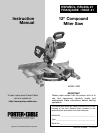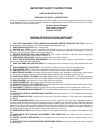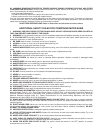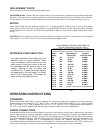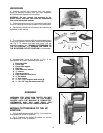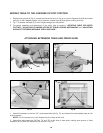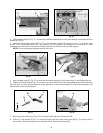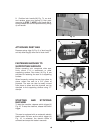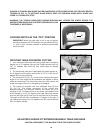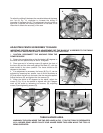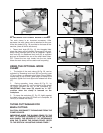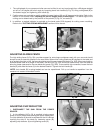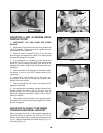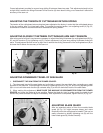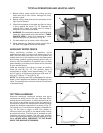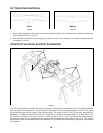IMPORTANT SAFETY INSTRUCTIONS
SAVE THESE INSTRUCTIONS
READ AND FOLLOW ALL INSTRUCTIONS.
This tool was designed for certain applications.DO NOT modify or use it for any application other than for which
it was designed. If you have any questions relative to its application do not use the tool until you have written
Porter-Cable and we have advised you.
Technical Service Manager
Porter-Cable Corporation
4825 Highway 45 North
Jackson, TN 38305
WARNING: FAILURE TO FOLLOW THESE RULES
MAY RESULT IN SERIOUS PERSONAL INJURY.
1. FOR YOUR OWN SAFETY, READ INSTRUCTION MANUAL BEFORE OPERATING THE TOOL. Learn the
tool’s application and limitations as well as the specific hazards peculiar to it.
2. KEEP GUARDS IN PLACE and in working order.
3. GROUND ALL TOOLS. If tool is equipped with three-prong plug, it should be plugged into a three-hole
electrical receptacle. If an adapter is used to accommodate a two-prong receptacle, the adapter lug must be
attached to a known ground. Never remove the third prong.
4. REMOVE ADJUSTING KEYS AND WRENCHES. Form habit of checking to see that keys and adjusting
wrenches are removed from the tool before turning it on.
5. KEEP WORK AREA CLEAN. Cluttered areas and benches invite accidents.
6. DON’T USE IN DANGEROUS ENVIRONMENT. Don’t use power tools in damp or wet locations, or expose
them to rain. Keep work area well-lighted.
7. KEEP CHILDREN AND VISITORS AWAY. All children and visitors should be kept a safe distance from work
area.
8. MAKE WORKSHOP CHILDPROOF – with padlocks, master switches, or by removing starter keys.
9. DON’T FORCE TOOL. It will do the job better and be safer at the rate for which it was designed.
10. USE RIGHT TOOL. Don’t force tool or attachment to do a job for which it was not designed.
11. WEAR PROPER APPAREL. No loose clothing, gloves, neckties, rings, bracelets, or other jewelry to get caught
in moving parts. Nonslip footwear is recommended. Wear protective hair covering to contain long hair.
12. ALWAYS USE SAFETY GLASSES. Wear safety glasses (must comply with ANSI Z87.1). Everyday eyeglasses
only have impact resistant lenses; they are not safety glasses. Also use face or dust mask if cutting operation is dusty.
13. SECURE WORK. Use clamps or a vise to hold work when practical.
14. DON’T OVERREACH. Keep proper footing and balance at all times.
15. MAINTAIN TOOLS IN TOP CONDITION. Keep tools sharp and clean for best and safest performance. Follow
instructions for lubricating and changing accessories.
16. DISCONNECT TOOLS before servicing and when changing accessories such as blades, bits, cutters, etc.
17. USE RECOMMENDED ACCESSORIES. The use of improper accessories may cause hazards or risk of injury to
persons.
18. REDUCE THE RISK OF UNINTENTIONAL STARTING. Make sure switch is in “OFF” position before plugging
in power cord.
19. NEVER STAND ON TOOL. Serious injury could occur if the tool is tipped or if the cutting tool is accidentally
contacted.
20. CHECK DAMAGED PARTS. Before further use of the tool, a guard or other part that is damaged should be
carefully checked to determine that it will operate properly and perform its intended function. Check for alignment
of moving parts, binding of moving parts, breakage of parts, mounting, and any other conditions that may affect its
operation. A guard or other part that is damaged should be properly repaired or replaced by an authorized service
center unless otherwise indicated elsewhere in this instruction manual. Have defective switches replaced by
authorized service center. Do not use tool if switch does not turn it on and off.
21. DIRECTION OF FEED. Feed work into a blade or cutter against the direction of rotation of the blade or cutter
only.
22. NEVER LEAVE TOOL RUNNING UNATTENDED. TURN POWER OFF. Don’t leave tool until it comes to a
complete stop.
23. DRUGS, ALCOHOL, MEDICATION. Do not operate tool while under the influence of drugs, alcohol or any
medication.
24. MAKE SURE TOOL IS DISCONNECTED FROM POWER SUPPLY while motor is being mounted, connected
or reconnected.
2



